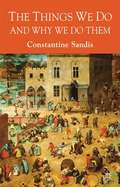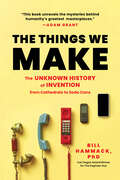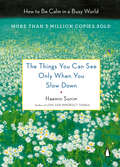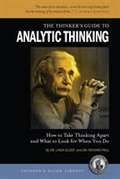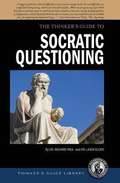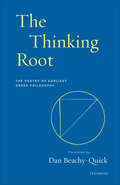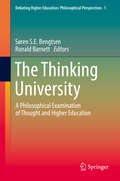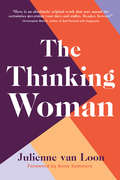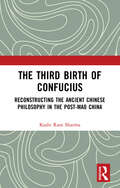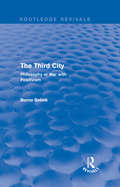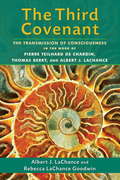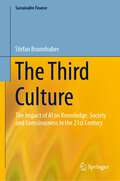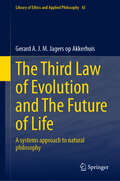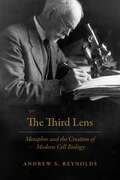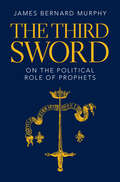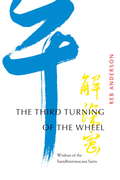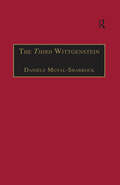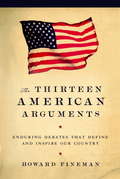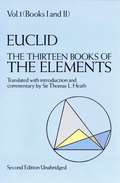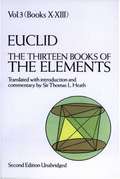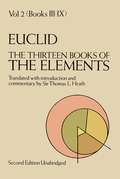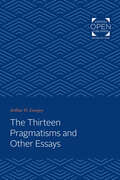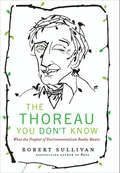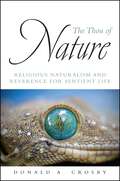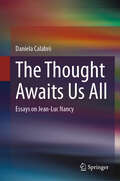- Table View
- List View
The Things We Do and Why We Do Them
by Constantine SandisThe Things We Do and Why We Do Them argues against the common assumption that there is one thing called 'action' which all reason-giving explanations of action are geared towards. Sandis shows why all theories concerned with identifying the nature of our 'real' reasons for action fail from the outset.
The Things We Make: The Unknown History of Invention from Cathedrals to Soda Cans
by Bill Hammack Ph.D.Discover the secret method used to build the world…For millennia, humans have used one simple method to solve problems. Whether it's planting crops, building skyscrapers, developing photographs, or designing the first microchip, all creators follow the same steps to engineer progress. But this powerful method, the "engineering method", is an all but hidden process that few of us have heard of—let alone understand—but that influences every aspect of our lives.Bill Hammack, a Carl Sagan award-winning professor of engineering and viral "The Engineer Guy" on Youtube, has a lifelong passion for the things we make, and how we make them. Now, for the first time, he reveals the invisible method behind every invention and takes us on a whirlwind tour of how humans built the world we know today. From the grand stone arches of medieval cathedrals to the mundane modern soda can, Hammack explains the golden rule of thumb that underlies every new building technique, every technological advancement, and every creative solution that leads us one step closer to a better, more functional world. Spanning centuries and cultures, Hammack offers a fascinating perspective on how humans engineer solutions in a world full of problems.Perfect for readers of Adam Grant and Simon Winchester, The Things We Make is a captivating examination of the method that keeps pushing humanity forward, a spotlight on the achievements of the past, and a celebration of the potential of our future that will change the way we see the world around us.
The Things You Can See Only When You Slow Down: How to Be Calm and Mindful in a Fast-Paced World
by Chi-Young Kim Haemin Sunim Youngcheol LeeA multimillion-copy bestselling book of spiritual wisdom about the importance of slowing down in our fast-paced world“Is it the world that’s busy, or is it my mind?”The world moves fast, but that doesn’t mean we have to. In this bestselling mindfulness guide—it has sold more than three million copies in Korea, where it was a #1 bestseller for forty-one weeks and received multiple Best Book of the Year awards, and it's being published in more than 20 countries—Haemin Sunim (which means "spontaneous wisdom"), a renowned Buddhist meditation teacher born in Korea and educated in the United States, illuminates a path to inner peace and balance amid the overwhelming demands of everyday life.By offering guideposts to well-being and happiness in eight areas—including relationships, love, and spirituality—Haemin Sunim emphasizes the importance of forging a deeper connection with others and being compassionate and forgiving toward ourselves. The more than twenty full-color illustrations that accompany his teachings serve as calming visual interludes, encouraging us to notice that when you slow down, the world slows down with you.
The Thinker's Guide to Analytic Thinking (Thinker's Guide series)
by Richard Paul Linda ElderThe Thinker’s Guide to Analytic Thinking explores the practice of analyzing problems and opportunities and provides a framework for finding common denominators, inconsistencies, biases, and underlying causes. It helps readers learn to think within the logic of subjects and professions. By offering proper tools for analysis and assessment of thought, it empowers readers to address any decision with confidence.
The Thinker's Guide to The Art of Socratic Questioning
by Richard Paul Linda ElderFocuses on the mechanics of Socratic dialogue, on the conceptual tools that critical thinking brings to Socratic dialogue, and on the importance of questioning in cultivating the disciplined mind.
The Thinking Root: The Poetry of Earliest Greek Philosophy (Seedbank)
by Dan Beachy-QuickAcclaimed poet and translator Dan Beachy-Quick offers this newest addition to the Seedbank series: a warm, vivid rendering of the earliest Greek intellects, inviting us to reconsider writing, and thinking, as a way of living meaningfully in the world. “We have lost our sense of thinking as the experience that keeps us in the world,” writes Beachy-Quick, and the figures rendered in The Thinking Root—Heraclitus, Anaximander, Empedocles, Parmenides, and others—are among the first examples we have in Western civilization of thinkers who used writing as to record their impressions of a world where intuition and observation, and spirit and nature, have yet to be estranged. In these pages, we find clear-eyed ideas searching for shapes and forms with which to order the world, and to reveal our life in flux. Drawn from “words that think,” these ancient Greek texts are fresh and alive in the hands of Beachy-Quick, who translates with the empathy of one who knows that “a word is its own form of life.” In aphorisms, axioms, vignettes, and anecdotes, these first theories of the world articulate a relationship to the world that precedes our story of its making, a world where “the beginning and the end are in common.” A remarkable collection from one of our most accomplished poets, The Thinking Root renders a primary apprehension of life amidst life, a vision that echoes our gaze upon the stars.
The Thinking University: The Selected Works Of Ronald Barnett
by Ronald Barnett Søren S.E. BengtsenThis book reinvigorates the philosophical treatment of the nature, purpose, and meaning of thought in today’s universities. The wider discussion about higher education has moved from a philosophical discourse to a discourse on social welfare and service, economics, and political agendas. This book reconnects philosophy with the central academic concepts of thought, reason, and critique and their associated academic practices of thinking and reasoning. Thought in this context should not be considered as a merely mental or cognitive construction, still less a cloistered college, but a fully developed individual and social engagement of critical reflection and discussion with the current pressing disciplinary, political, and philosophical issues. The editors hold that the element of thought, and the ability to think in a deep and groundbreaking way is, still, the essence of the university. But what does it mean to think in the university today? And in what ways is thought related not only to the epistemological and ontological issues of philosophical debate, but also to the social and political dimensions of our globalised age? In many countries, the state is imposing limitations on universities, dismissing or threatening academics who speak out critically. With this volume, the editors ask questions such as: What is the value of thought? What is the university’s proper relationship to thought?To give the notion of thought a thorough philosophical treatment, the book is divided into in three parts. The focus moves from an epistemological perspective in Part I, to a focus on existence and values in higher education in Part II, and then to a societal-oriented focus on the university in Part III. All three parts, in their own ways, debate the notion of thought in higher education and the university as a thinking form of being.
The Thinking Woman
by Julienne van LoonOne of the age-old questions of philosophy is what does it mean to live a good life? Such concerns are important to us all, yet the voices and thoughts of women have often been missing from the conversation. In this extraordinary book, award-winning writer, Julienne van Loon addresses the work of leading international thinkers, interrogating and enlivening their ideas on everyday issues. She discusses friendship with pre-eminent philosopher Rosi Braidotti, wonder with cultural historian Maria Warner, play with celebrated novelist Siris Hustvedt, love with cultural critic Laura Kipnis, work with socialist feminist Nancy Holmstrom, and fear in relation to the work of Helen Caldicott, Rosie Batty and Julia Kristeva. Her journey is intellectual and deeply personal, political and intimate at once. It introduces readers to some extraordinary women whose own deeply thoughtful work has much to offer all of us. They may transform our own views of what it means to live a good life.
The Third Birth of Confucius: Reconstructing the Ancient Chinese Philosophy in the Post-Mao China
by Kashi Ram SharmaThe Third Birth of Confucius deals with the Chinese sage and philosopher Confucius and his philosophical and politico-cultural legacies.As the title suggests, Confucius has once again taken birth in China. Confucius ‘died’ for the first time when he gave way to Buddhism in the tenth century, but was reinvented again (Neo-Confucianism). This was the second birth of Confucius. In the twentieth century, under the influence of western ideas China’s liberals and Marxists abandoned Confucius again.But how long can a civilization live without any ideational orientation? Hence, the third birth of Confucius from AD 2000 onwards. Confucius is emerging as a proxy word for cultural nationalism.In fact, it is not one Confucius who is taking birth in China but two. One is the common man’s Confucius, which is authentic and genuine. The other Confucius is promoted by the Chinese Government. The author believes that soon either China will embrace democracy or it may implode and disintegrate like the former Soviet Union.This book is an attempt to unravel the muddled reality of China and will definitely prove a landmark work in the field of Chinese Studies.
The Third City: Philosophy at War with Positivism (Routledge Revivals)
by Borna BebekThe Third City, first published in 1982, offers an innovative response to the troubled relationship between Western philosophy, as it has been conducted since the Renaissance, and the everyday lives of the communities in which we live. Bebek contends that the model of philosophical reflection is to be found in Plato’s dialogues, which, rather than simply describing utopia through a series of abstract ‘concepts’, were instead designed to impel the learner towards a recognition of the true nature of reality – as much a ‘self-recognition’ as an understanding of the world ‘out there’. Thus, in order to revive the spirit of true philosophy, it is necessary to avoid both the false extremes of idealism and materialism, and to allow ethics once more to merge with epistemology. This title presents an exposition of this ethically based philosophy, allowing the very human insights of Plato to illumine the diverse problems of today.
The Third Covenant
by Albert J. Lachance Rebecca Lachance GoodwinThe Third Covenant explores the work of Pierre Teilhard de Chardin, Thomas Berry, and Albert LaChance, revealing through the lens of spirituality, science, and ecology, their understanding of human origin and evolution. Pierre Teilhard de Chardin, an early twentieth century geologist and priest, devoted his life as a scientist, clergyman, and mystic, to reuniting the artificial fracture between science and religion. Thomas Berry, a follower of Teilhard de Chardin and a highly respected cultural historian, furthered this reunification by repositioning the human in the unfolding of an evolving universe, integrated and interdependent with the rest of the life systems of the planet. Albert LaChance, himself a six-year, face-to-face student of Berry, brought this new paradigm into his work as a poet, psychologist, addiction recovery professional, and most importantly, as a mystic and scholar of religion. Along with his daughter, Rebecca LaChance Goodwin, LaChance explores the development of this crucial shift in human understanding and its implications for the future.Parts I and II explore the elements of polarized thinking that makes us believe that we are separate from each other and the life systems of the planet. Thomas Berry's list of twelve principles for understanding the universe and the role of the human in the universe process describes the creative unfolding of our place in the universe. Part III introduces practical steps for achieving personal, familial, and cultural change. LaChance outlines his Twelve Steps of Ecological Spirituality to help us move from powerlessness and isolation to a state of reawakening to self, to humanity, to all species, to the planet, and to the universe.
The Third Culture: The Impact of AI on Knowledge, Society and Consciousness in the 21st Century (Sustainable Finance)
by Stefan BrunnhuberWe are currently witnessing the emergence of a ‘third culture’, driven by unprecedented developments that are changing the playing field. These include advances in AI, big data analysis and robotics. The traditional ‘two cultures’ view (S. P. Snow) distinguishes between the sciences and the humanities. The wisdoms these two cultures offer are separated from each other, with little to no interaction or mutual comprehension. However, over the past two decades, and for the first time in human history, a new, third culture has appeared. This new culture, rooted in new technologies, not only pursues its own form of rationality but also supports advances in the original two cultures, deepening and expanding our individual and collective consciousness so that we can see more and do better. It will eventually give rise to new forms of consciousness based not on biochemical signals, but on copper wires and lithium chips. These new machine intelligences will change the world and force us to realise: we are no longer alone. The human species’ position in the twenty-first century will be fundamentally redefined: not as a conductor leading the orchestra, but a single string player within it.
The Third Law of Evolution and The Future of Life: A systems approach to natural philosophy (Library of Ethics and Applied Philosophy #43)
by Gerard A. Jagers op AkkerhuisThis book offers a step-by-step introduction to an integrated theory of physical and biological evolution, from the early universe to the world we know today. To this end, the well-known laws of variation and selection are supplemented by a third law. This law describes the increase in complexity based on the transitions from quarks to hadrons, to atoms, to molecules, to bacteria, to eukaryotic cells, and so on. These insights revolutionize existing theoretical frameworks for analyzing organization in nature, accelerating developments in natural philosophy. In this way, the author develops a basic framework for thinking about evolution, which can be applied to current debates in various research fields. For example, the new approach finally helps to find the systems-based definitions of organism and life that have been sought for so long. By extrapolating the framework one can even hypothesize about future evolution and our place as humans in it. An exciting read for both philosophers and scientists.
The Third Lens: Metaphor and the Creation of Modern Cell Biology
by Andrew S. ReynoldsDoes science aim at providing an account of the world that is literally true or objectively true? Understanding the difference requires paying close attention to metaphor and its role in science. In The Third Lens, Andrew S. Reynolds argues that metaphors, like microscopes and other instruments, are a vital tool in the construction of scientific knowledge and explanations of how the world works. More than just rhetorical devices for conveying difficult ideas, metaphors provide the conceptual means with which scientists interpret and intervene in the world. Reynolds here investigates the role of metaphors in the creation of scientific concepts, theories, and explanations, using cell theory as his primary case study. He explores the history of key metaphors that have informed the field and the experimental, philosophical, and social circumstances under which they have emerged, risen in popularity, and in some cases faded from view. How we think of cells—as chambers, organisms, or even machines—makes a difference to scientific practice. Consequently, an accurate picture of how scientific knowledge is made requires us to understand how the metaphors scientists use—and the social values that often surreptitiously accompany them—influence our understanding of the world, and, ultimately, of ourselves. The influence of metaphor isn’t limited to how we think about cells or proteins: in some cases they can even lead to real material change in the very nature of the thing in question, as scientists use technology to alter the reality to fit the metaphor. Drawing out the implications of science’s reliance upon metaphor, The Third Lens will be of interest to anyone working in the areas of history and philosophy of science, science studies, cell and molecular biology, science education and communication, and metaphor in general.
The Third Turning of the Wheel
by Reb Anderson James William ColemanIn his previous book, Being Upright: Zen Meditation and the Bodhisattva Precepts, Reb Anderson Roshi described how we must become thoroughly grounded in conventional truth through the practice of compassion before we can receive the teachings of the ultimate truth. In The Third Turning of the Wheel, he introduces us to the next stage of our journey by invoking the wisdom of the Samdhinirmocana Sutra.According to Anderson, the main purpose behind this enigmatic sutra is to reconcile the apparent contradictions between the original teachings of the historical Buddha and the later teachings of Mahayana Buddhism. Anderson reflects on the great metaphysical questions proposed in the Samdhinirmocana Sutra-the nature of ultimate reality, the structure of human consciousness, the characteristics of phenomena, the stages of meditation, and the essential qualities of a buddha-with the clarity of a scholar and the insight of a practitioner.
The Third Wittgenstein: The Post-Investigations Works (Ashgate Wittgensteinian Studies)
by Danièle Moyal-SharrockThis anthology establishes the existence of a distinct and important post-Investigations Wittgenstein, uncovering the overlooked treasures of the final corpus and crystallising key perceptions of what his last thought was achieving. Speaking of a 'third Wittgenstein', this book seeks to correct the traditional bipartite conception of Wittgenstein's thought into his Tractatus and Philosophical Investigations by focusing on his neglected last masterpiece, On Certainty, and works contemporaneous with it: Remarks on Colour, Last Writings in the Philosophy of Psychology, and Remarks on the Philosophy of Psychology. Â Leading international Wittgenstein scholars reveal why On Certainty should be recognised as one of Wittgenstein's three great works. This sustained examination shows that the third Wittgenstein breaks new ground with insights unprecedented in both his own work and philosophy more broadly, giving us keys to the solution and dissolution of problems that have plagued philosophy since Descartes, such as philosophical scepticism and the mind-body problem. Wittgenstein's ultimate and revised positions with regard to epistemology, foundationalism, 'grammar', naturalism, the psychology of language, and psychological indeterminacy are clearly delineated. This book also provides new and illuminating accounts of difficult concepts, such as patterns of life, experiencing meaning, meaning blindness, lying and pretence.
The Thirteen American Arguments
by Howard FinemanHoward Fineman, one of our most trusted political journalists, shows that every debate, from our nation’s founding to the present day, is rooted in one of thirteen arguments that–thankfully–defy resolution. It is the very process of never-ending argument, Fineman explains, that defines us, inspires us, and keeps us free. At a time when most public disagreement seems shrill and meaningless, Fineman makes a cogent case for nurturing the real American dialogue. The Thirteen American Argumentsruns the gamut, including •Who Is a Person?The Declaration of Independence says “everyone,” but it took a Civil War, the Civil Rights Act, and other movements to make that a reality. Now, what about human embryos and prisoners in Guantanamo? •The Role of FaithNo country is more legally secular yet more avowedly prayerful. From Thomas Jefferson to James Dobson, the issue persists: Where does God fit in government? •America in the WorldIn Iraq and everywhere else, we ask ourselves whether we must change the world in order to survive and honor our values–or whether the best way to do both is to deal with the world as it is. Whether it’s the nomination of judges or the limits of free speech, presidential power or public debt, the issues that galvanized the Founding Fathers should still inspire our leaders, thinkers, and fellow citizens. If we cease to argue about these things, we cease to be. “Argument is strength, not weakness,” says Fineman. “As long as we argue, there is hope, and as long as there is hope, we will argue. ”
The Thirteen Books of the Elements (Dover Books on Mathematics #1)
by EuclidThis is the definitive edition of one of the very greatest classics of all time — the full Euclid, not an abridgement. Using the text established by Heiberg, Sir Thomas Heath encompasses almost 2,500 years of mathematical and historical study upon Euclid.This unabridged republication of the original enlarged edition contains the complete English text of all 13 books of the Elements, plus a critical apparatus that analyzes each definition, postulate, and proposition in great detail. It covers textual and linguistic matters; mathematical analyses of Euclid’s ideas; classical, medieval, Renaissance, modern commentators; refutations, supports, extrapolations, reinterpretations, and historical notes, all given with extensive quotes.“The textbook that shall really replace Euclid has not yet been written and probably never will be.” — Encyclopaedia Britannica.Volume 1. 151-page Introduction: life and other works of Euclid; Greek and Islamic commentators; surviving mss., scholia, translations; bases of Euclid’s thought. Books I and II of the Elements, straight lines, angles, intersection of lines, triangles, parallelograms, etc.
The Thirteen Books of the Elements, Vol. 3 (Dover Books on Mathematics #3)
by EuclidThis is the definitive edition of one of the very greatest classics of all time—the full Euclid, not an abridgement. Utilizing the text established by Heiberg, Sir Thomas Heath encompasses almost 2500 years of mathematical and historical study upon Euclid.This unabridged republication of the original enlarged edition contains the complete English text of all 13 books of the Elements, plus a critical apparatus which analyzes each definition, postulate, and proposition in great detail. It covers textual and linguistic matters; mathematical anayses of Euclid's ideas; classical, medieval, Renaissance, modern commentators; refutations, supports, extrapolations, reinterpretations, and historical notes, all given with extensive quotes.
The Thirteen Books of the Elements: Books Iii-ix (classic Reprint) (Dover Books on Mathematics #2)
by EuclidThis is the definitive edition of one of the very greatest classics of all time — the full Euclid, not an abridgement. Using the text established by Heiberg, Sir Thomas Heath encompasses almost 2,500 years of mathematical and historical study upon Euclid.This unabridged republication of the original enlarged edition contains the complete English text of all 13 books of the Elements, plus a critical apparatus that analyzes each definition, postulate, and proposition in great detail. It covers textual and linguistic matters; mathematical analyses of Euclid’s ideas; classical, medieval, Renaissance, modern commentators; refutations, supports, extrapolations, reinterpretations, and historical notes, all given with extensive quotes. Volume 1. 151-page Introduction: life and other works of Euclid; Greek and Islamic commentators; surviving mss., scholia, translations; bases of Euclid’s thought. Books I and II of the Elements, straight lines, angles, intersection of lines, triangles, parallelograms, etc.Volume 2. Books III-IX: Circles, tangents, segments, figures described around and within circles, rations, proportions, magnitudes, polygons, prime numbers, products, plane and solid numbers, series of rations, etc.Volume 3. Books X to XIII: planes, solid angles, etc.; method of exhaustion in similar polygons within circles, pyramids, cones, cylinders, spheres, etc. Appendix: Books XIV, XV, sometimes ascribed to Euclid.
The Thirteen Pragmatisms and Other Essays
by Arthur O. LovejoyOriginally published in 1963. The essays in this volume are critical and, with one exception, directed against the philosophic movement of pragmatism. "The Thirteen Pragmatisms" is an exercise in logical analysis and is a challenge to a group of philosophers who have taken on a collective name to show how their apparent diversities are to be reconciled. Few philosophers would call themselves orthodox followers of this train of thought, so these essays can be studied without a sense of personal injury that deadens the critical faculty and obscures insight. In The Thirteen Pragmatisms and Other Essays, logical technique is on display: the author's keenness in spotting double meanings and his ability to rephrase them in univalent form. This collection of essays should afford students of philosophy a set of cases in which they need not take sides but which give them an analytical method they can practice themselves on contemporary issues. The fact that these essays are on the whole critical gives them a heuristic value that dogmatic or expository essays would not have.
The Thoreau You Don't Know: What the Prophet of Environmentalism Really Meant
by Robert "Sully" SullivanRobert Sullivan, the New York Times bestselling author of Rats and Cross Country, delivers a revolutionary reconsideration of Henry David Thoreau for modern readers of the seminal transcendentalist. Dispelling common notions of Thoreau as a lonely eccentric cloistered at Walden Pond, Sullivan (whom the New York Times Book Review calls “an urban Thoreau”) paints a dynamic picture of Thoreau as the naturalist who founded our American ideal of “the Great Outdoors;” the rugged individual who honed friendships with Ralph Waldo Emerson and other writers; and the political activist who inspired Martin Luther King, Jr., Mahatma Gandhi, and other influential leaders of progressive change. You know Thoreau is one of America’s legendary writers…but the Thoreau you don’t know may be one of America’s greatest heroes.
The Thou of Nature: Religious Naturalism and Reverence for Sentient Life
by Donald A. CrosbyHumans share the earth with nonhuman animals who are also capable of conscious experience and awareness. Arguing that we should develop an I-thou, not an I-it, relationship with other sentient beings, Donald A. Crosby adds a new perspective to the current debates on human/animal relations and animal rights—that of religious naturalism. Religion of Nature holds that the natural world is the only world and that there is no supernatural animus or law behind it. From this vantage point, our fellow thous are entitled to more than merely moral treatment: protection and enhancement of their continuing well-being deserves to be a central focus of religious reverence, care, and commitment as well. A set of presumptive natural rights for nonhuman animals is proposed and conflicts in applying these rights are acknowledged and considered. A wide range of situations involving humans and nonhuman animals are discussed, including hunting and fishing; eating and wearing; circuses, rodeos, zoos, and aquariums; scientific experimentation; and the threats of human technology and population growth.
The Thought Awaits Us All: Essays on Jean-Luc Nancy
by Daniela CalabròThis volume shows how Nancy was able ‘to deconstruct’ the founding sign of all metaphysics and all transcendence by redefining the concepts of existence, corporeality, and community, opening them up to the ‘disclosure’ of the outside, to the ‘exception’ of the world. It draws on the work of the Italian philosopher, Roberto Esposito and includes a dialogue between Nancy and Esposito. The overcoming of the modern perspective is covered by Descartes and Hegel, who are analyzed in light of Nancy. This text proposes a deconstruction of the Western tradition in its philosophical, aesthetic, and political registers and conveys a new ontology that breaks with the categories of the One and the Multiple, the Universal and the Particular, in order to identify the relationship between the plural and the singular and understand what it means to be together, to be in common, to be in the world. It is suitable for scholars, researchers, and students of philosophy and comparative literature.
